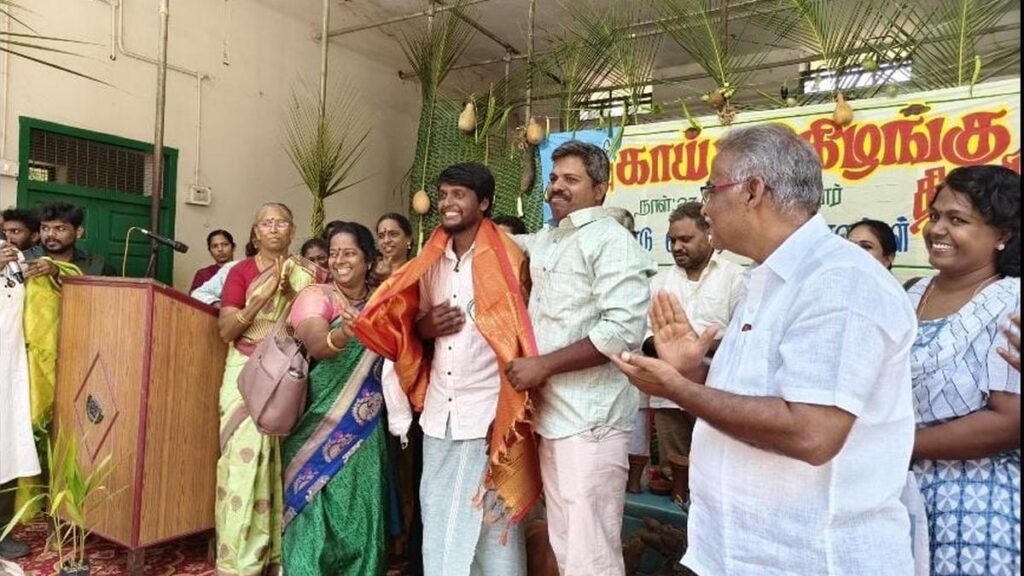When the pandemic had people cooped up in their homes imposing debilitating restrictions on their routine and movement, the terrace was “discovered”. The top deck became well-hoofed, residents becoming alive to its potential. Little wonder then that a terrace gardening group in Chennai that was seeded before the pandemic truly geminated in 2021, becoming a full-fledged community. Maintaining that momentum over the last four years, Chennai Maadi Thotta Kootam, as this group is called, has risen several levels to accommodate 500 terraces (read “over 500 members”). Terraces outside the fold also benefitting from this group’s programmes, the number should actually be pegged much higher than that.
In organisational parlance, seven members would be the equivalent of charter members, having cranked the initiative and push-started it when it showed signs of stalling. They are spread across Chennai, in fact the Chennai Metropolitan Area: Bhuvaneshwari is from Anna nagar; Rama from St. Thomas Mount; Sujo Jones from Tambaram; Mohan also from Tambaram; Logamary from Kodambakkam; Uma from Saidapet; and Rajesh from Thiruvallur. There are other early members, but these are counted among those members that have continued to keep this informal, largely WhatsApp-centric and rarely offline group together.
Mohan, one of the founders, clarifies that this group is far from being an organisation, and defines it as as a loosely structured but tightly knit network of terrace gardeners. Chennai Maadi Thotta Kootam has no formal hierarchy, office or funding. It thrives on shared commitment, a shared interest in sustainable, fertiliser-free gardening. Seeds are packed at dining tables. Deliveries are arranged in group chats. Advice is traded with the air of informality and bonhomie one would expect among friends.
A salient feature of this group that has remained prominent to this day is exchange of traditional seeds among members. The batches of seeds the group collects come into sharp focus at one grand annual gathering.
Every year, ahead of the Tamil month of Aadi (mid-July to mid-August), which marks the sowing season, the group organises a massive Saturday Seed Exchange Meet.
At the time of this article going to print, a meet of this proportion and significance was being organised at Anna Nagar Tower Park.
Unlike typical markets or agricultural expos, these events are entirely non-commercial. Seeds are not bought or sold — they are freely given, with trust as the only currency.
“We pack around 500 packets for each variety and hand them out to whoever is interested,” Mohan says. “There is no cost involved. The only expectation is that the seeds are used, not wasted.”
The event typically features more than 30 types of native, non-hybrid seeds of vegetables — including brinjals, tomatoes, lady’s finger, snake gourd, cluster beans and compact varieties of bottle gourd — are ideal for urban terraces. These are carefully sorted into ziplock bags and handed over to anyone willing to try their hand at gardening.
\Attendees share the origin stories of the seeds, and discuss what worked and did not in their soil. For those unable to attend the meet, the group arranges for the seeds to be couriered to them, ensuring that the cycle of growth and sharing continues uninterrupted. In some weeks, more than 200 such couriers are sent out, says Mohan.
Wider impact
These meet-ups bring seeds and voices from across India on one platform. Renowned seed savers and farming advocates are invited as guest speakers. Sundar from Pondicherry, a visual communication graduate turned traditional seed conservator, is a regular presence. Over the last decade, he has travelled across Tamil Nadu collecting and documenting over 200 types of vegetable seeds, including 50 varieties of tomatoes and nearly 30 types of brinjals.
“Out of just three sorakais, I can get 150 seeds,” Sundar says. “I give a few to others, and if they grow them, the cycle continues. It is not just agriculture — it is a form of trust-building.”
Joining him this year at the meet at Anna Nagar Tower Park are Appa Rao, a national award-winning seed conservator from Andhra Pradesh, and Pambayan, an advocate of pesticide- free gardening. Together, they promote inter-state seed exchange—Tamil Nadu’s native yam seeds are shared with Appa Rao, who in return brings hardy Andhra varieties to the city. It is an example of grassroots biodiversity cutting across state borders.
Digital gardening
A WhatsApp group is the glue keeping these terrace gardeners together. Have you ever come across pest control techniques and potting mix ratios being hurriedly spat out into voice messages? In this group, you will on a daily basis, sometimes on an hourly basis. Members regularly post photos of wilting leaves or insect sightings, asking for quick advice — and receiving responses often within minutes. Chennai Maadi Thottam Kootam is largely women-led, with 90% of members identifying as female. For many, terrace gardening has become more than a hobby; it is a way to reconnect with nature, manage kitchen waste, and introduce children to the rhythms of growth and seasonality.
A larger goal
Sundar’s philosophy resonates deeply with the group. Since 2015, he has been working to revive traditional farming practices through awareness, seed sharing and documentation. His goal is to build a community seed bank that functions independently of commercial seed markets or government schemes. He also hopes to compile his knowledge into a book for future generations. “There is still hesitation among beginners,” he says. “People do not believe these small seeds will really work. So I show them videos of my own farm, and when they see 200 chillies growing from native varieties, they start to believe.”
For details about the group, call 9941363041
Published – June 28, 2025 06:13 pm IST
Source:https://www.thehindu.com/news/cities/chennai/stock-exchange-with-a-difference-how-members-of-a-whatsapp-driven-ground-keep-native-seeds-of-vegetables-alive/article69748365.ece

